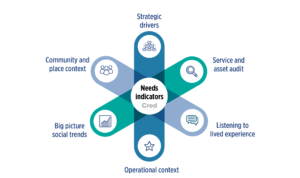Better Buildings Partnership (BBP), City of Sydney
Creating Resilient Communities, a guide for property owners and managers
The Better Buildings Partnership is a collaboration of property owners and managers that plays a key role in improving the performance and sustainability of existing buildings in the City of Sydney area and across Australia. Currently the BBP is made up of a number of Sydney’s leading commercial and public sector landlords, including partner members Brookfield Properties, Charter Hall, City of Sydney, DEXUS Property Group, Frasers Property, The GPT Group, Investa, ISPT, Lendlease, Mirvac, Stockland, and University of Technology Sydney. Associate members include key leasing agents CBRE, Colliers International and Jones Lang LaSalle. Supporting members of the partnership include the Property Council of Australia, Good Environmental Choice Australia, the Green Building Council of Australia, NABERS, and the City of Melbourne.
The partnership was launched in 2011, and for the past decade the BBP has successfully focused on improving building outcomes around energy, water and waste. However, following the experience of multiple natural disasters and the pandemic over the past few years, the BBP decided to have a greater focus on resilient and inclusive buildings, communities and places.
BBP recognised the need for practical action to address and embed resilience within organisations, communities and precincts is more important than ever before, and engage Cred Consulting to develop a guide for community resilience aiming to build on momentum across the property industry.
At its core, social cohesion is the foundation of community resilience. Strong social networks, a sense of belonging and trust enables communities to come together and support one another during challenging times. Without trust, shared values and cooperation based on equal opportunities, societies are more likely to experience unrest and disorder which in turn makes it harder to cope when disruptions occur.

Cred led the development of “Creating resilient communities – A Guide for property owners and managers” (the Guide). Caring about community resilience is not only a matter of ethical responsibility but a strategic decision that benefits property managers and owners by improving tenant satisfaction, reducing risks, improving safety and security, enhancing property value, and positioning properties competitively in the market.
How we did it
Drawing on our extensive experience in community resilience, social cohesion and social value, Cred co-designed the Guide with the BBP resilience working group.
Actions and case studies in the guide are organised under the focus areas of:
- Community inclusion and connection
- Health, wellbeing and access
- Equity and economic prosperity
- Emergency preparedness
Cred is a strong advocate for understanding community needs as a first principle in delivering social value. Understanding needs is about having an evidence base of the unique challenges and opportunities that exist in a community. In the Guide, we have included our community needs indicators (see below) to support property owners and managers in knowing what data they need to guide their efforts in delivering community resilience actions and programs to success.

The outcome
The Guide provides direction for organisations at various scales and levels of maturity in delivering social value, including those who are well on the way as well as those who are just starting out on their journey.
The Guide describes:
- Why property owners and managers should play a role in strengthening community resilience.
- How property owners and managers can understand community resilience needs.
- Examples of activities that property owners and managers can do to strengthen community resilience.
- Best practice case studies to inspire ideas.
- Example metrics to help measure social impact from investment in community resilience actions.
- A maturity self-assessment tool to provide a high-level snapshot of your organisation’s level of maturity in strengthening community resilience.
Banner image source: Yerrabingin
